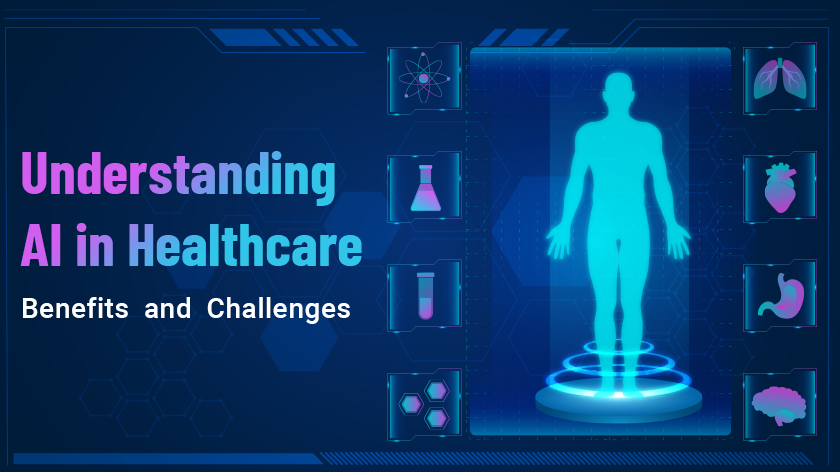In the rapidly evolving landscape of healthcare, the integration of artificial intelligence (AI) promises transformative advancements with profound implications for patient care, diagnosis, and treatment. However, alongside its potential benefits, AI in healthcare also presents a myriad of challenges that must be carefully navigated to realize its full potential. In this exploration, we delve into the depths of AI in healthcare, unraveling its benefits and confronting the complexities that lie ahead.
Benefits of AI in Healthcare:
- Enhanced Diagnostics: AI algorithms have demonstrated remarkable capabilities in interpreting medical images with a level of accuracy that rivals, and sometimes surpasses, human experts. By analyzing vast datasets of images, such as X-rays, MRIs, and CT scans, AI can swiftly identify abnormalities and aid in the early detection of diseases such as cancer. This not only expedites diagnosis but also reduces the likelihood of diagnostic errors, ultimately improving patient outcomes.
- Personalized Treatment: One of the most promising applications of AI in healthcare lies in its ability to tailor treatment plans to the unique characteristics of individual patients. By analyzing diverse patient data, including genetic information, medical history, and lifestyle factors, AI can generate personalized treatment recommendations that optimize efficacy and minimize adverse effects. This precision medicine approach holds the potential to revolutionize the delivery of healthcare, offering targeted therapies that are tailored to each patient’s specific needs.
- Predictive Analytics: AI-powered predictive models have the ability to analyze vast amounts of patient data to forecast disease outbreaks, identify high-risk individuals, and anticipate potential complications. By leveraging machine learning algorithms, healthcare providers can proactively intervene to prevent adverse events, optimize resource allocation, and improve population health outcomes. From predicting the spread of infectious diseases to identifying patients at risk of readmission, predictive analytics powered by AI holds the promise of revolutionizing healthcare delivery on a global scale.
- Workflow Optimization: Automation of routine tasks and administrative duties through AI-driven systems can streamline healthcare workflows, freeing up valuable time for healthcare professionals to focus on patient care. From scheduling appointments to transcribing clinical notes, AI-powered tools can enhance efficiency, reduce administrative burdens, and mitigate the risk of human error. This not only improves the productivity of healthcare teams but also enhances the overall quality of care delivered to patients.
Challenges in Implementing AI in Healthcare:
- Data Privacy and Security: As healthcare organizations increasingly rely on AI to analyze sensitive patient data, ensuring the privacy and security of this information is paramount. Data breaches and unauthorized access pose significant risks to patient confidentiality and trust, underscoring the need for robust security measures and compliance with regulatory requirements such as the Health Insurance Portability and Accountability Act (HIPAA).
- Interoperability: Integrating AI systems with existing healthcare infrastructure and electronic health records (EHRs) presents significant interoperability challenges. Standardizing data formats, establishing interoperable protocols, and facilitating seamless data exchange between disparate systems are critical prerequisites for the successful deployment of AI in healthcare settings.
- Ethical Considerations: Ethical dilemmas surrounding AI in healthcare, including algorithmic bias, patient consent, and accountability for algorithmic decisions, demand careful consideration. The potential for bias in AI algorithms, if left unchecked, could perpetuate existing disparities in healthcare delivery and outcomes. Moreover, ensuring transparent communication, informed consent, and human oversight are essential for maintaining the ethical integrity of AI-driven healthcare systems.
- Regulatory Hurdles: Navigating the complex regulatory landscape governing the development, deployment, and reimbursement of AI technologies in healthcare poses significant challenges. Regulatory frameworks must adapt to accommodate the unique characteristics of AI-driven healthcare solutions while ensuring patient safety, efficacy, and equitable access. Clear guidelines, robust oversight mechanisms, and collaboration between stakeholders are essential for overcoming regulatory hurdles and fostering innovation in AI-driven healthcare.
Conclusion:
The integration of AI into healthcare holds immense promise for revolutionizing the delivery of care, improving patient outcomes, and enhancing efficiency. However, realizing this potential requires addressing a range of complex challenges, including data privacy, interoperability, ethics, and regulation. By navigating these hurdles thoughtfully and collaboratively, we can harness the full power of AI to transform healthcare for generations to come.
If you’re looking to utilize the power of AI in healthcare and want to explore its potential for improving outcomes, connect with the XcelTec team today. Let’s discuss how we can collaborate to navigate the benefits and tackle the challenges of AI in your healthcare projects!
Visit Our Website: https://www.xceltec.com/

